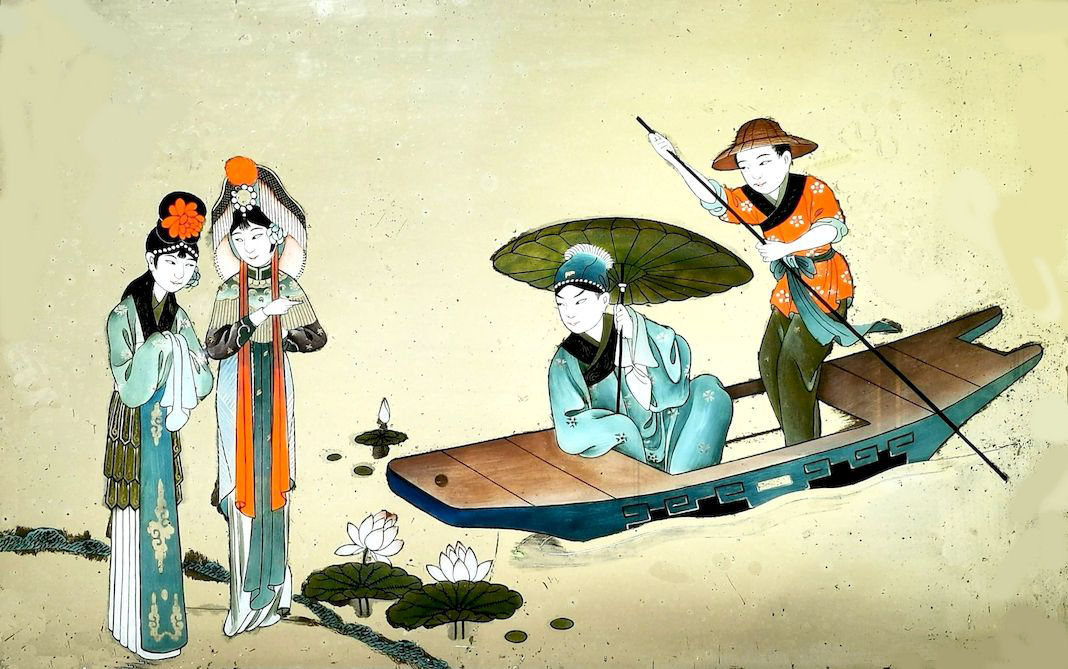
“They did what people do there, which was to walk along enjoying the scenery.”
(Reverse Glass Painting from the Mei Lin Collection [Rupprecht Mayer and Haitang Mayer-Liem])"
BÁI Sùzhēn 白素贞 = a beautiful maid transformed from a white Daoist snake
Xiǎoqīng 小清 = her maid, also beautiful, transformed from a green Daoist snake
XǓ Xiān 许仙 = an affable but impoverished young herbalist
Dharma Sea (Fǎhǎi 法海) = a Buddhist priest, knowledgeable about transformed snakes and not at all keen on them. (It may or may not be significant that this is the same name as the priest traditionally believed to have created the tale of the Sixth Patriarch, available on this web site. Link.)
Long ago at Mt. Éméi 峨眉 (in Sìchuān 四川 province) there lived two snakes, a white one and a green one. They had been engaging in ascetic practices for a thousand years, and had gained the ability and desire to become beautiful maidens in the world of human beiongs. For this reason they transformed themselves into BÁI Sùzhēn 白素贞 (“white-pure-loyal”) and Xiǎoqīng 小清 (“little green”).

They appeared abruptly, standing beside West Lake (Xīhú 西湖) in Zhèjiāng 浙江 province, the most beautiful place in all the world. So they did what people do there, which was to walk along enjoying the scenery. They got as far as the famous Broken Bridge (Duànqiáo 断桥) when it started to rain, and they took temporary refuge under a willow.
Soon there passed by an affable but naïve young herbalist named XǓ Xiān 许仙, who was carrying an umbrella as he returned from piously sweeping his ancestors’ graves. Seeing the two beautiful maidens sheltering under the tree, he lent them his umbrella and helped them summon a boat to take them home.
Bái immediately fell in love with him, and told him to come to their house the next day to retrieve the umbrella. In the course of that visit she learned that he was an orphan, living with his older sister, and working in an apothecary shop.
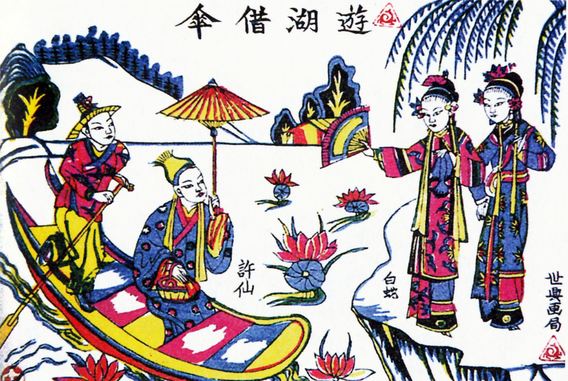
She proposed that they be married. Xǔ was delighted, being too poor to have other prospects, and being dazzled by her great beauty in any event. So under the direction of Xiǎoqīng they worshipped heaven and earth and joined in marriage. They opened their own apothecary, and Bái proved to be excellent at compounding drugs. Soon they had a thriving clientele.
At the Golden Mountain Monastery (Jīnshān Sì 金山寺) in the town of Zhènjiāng 镇江, there dwelt a priest named Dharma Sea (Fǎhǎi 法海), who recognized Bái as a snake demon (shéyāo 蛇妖) of great potential danger to humans, and he sought to warn the affable but naïve Xǔ.
(Some people say that Dharma Sea was actually an evil monk, who deliberately caused a great plague to afflict the region in the hope of getting people to buy his incense and contribute to his temple as they prayed for a cure. When Bái's apothecary skills easily healed people from the plague, this —not concern for Xǔ's welfare— was the real beginning of Dharama Sea's hostility to her.)
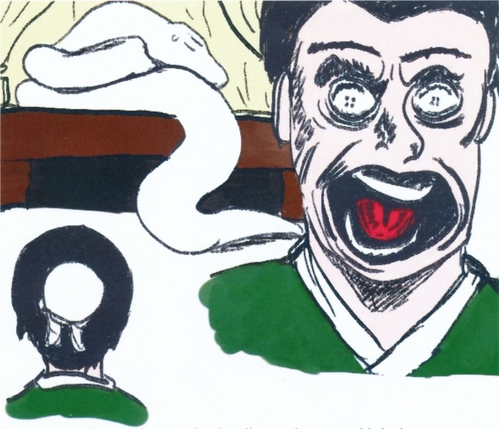
But Xǔ refused to believe that his wife was a snake demon. The priest told him to get her drunk at the day of the Lantern Festival (Duānwǔ Jié 端午节), and she would revert to her true form. And so he did this, but she became quite ill, and retired to bed. As he went in to tend to her distress, he saw on his bed an enormous white snake, and was so frightened that he immediately died.
When she had recovered, Bái was horrified to discover her husband lying dead, and she appealed to her sister Xiǎoqīng to help find various herbs needed to bring him back to life. (Glossy ganoderma [língzhīcǎo 灵芝草] turns out to be used for the purpose, should you have need.)
Bái’s trip to obtain (steal) the magic medicine involved her in martial arts battles with its guardian and other adventures, but she did succeed in reviving Xǔ. However he still worried a bit about Bái’s reptilian tendencies even though he felt grateful to her for bringing him back to life.
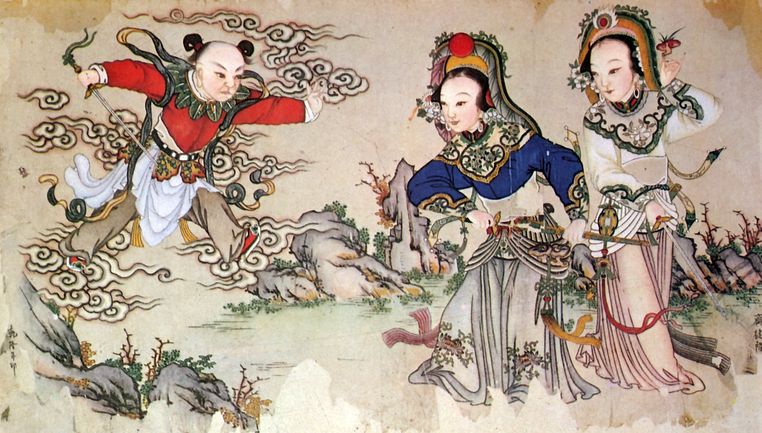
The priest Dharma Sea was still unsatisfied. He kidnapped Xǔ and took him into protective custody at the monastery. When her husband did not return, Bái was distraught, and quick to realize what had happened. Her sister Xiǎoqīng urged her to give up on her inappropriate marriage to Xǔ. There must be a nice he-snake out there who would make a fine husband. But the argument fell on deaf ears.
Meanwhile Xǔ, trapped in the monastery, was correspondingly distraught, although Dharma Sea urged him to forget about the snake demon.
Eventually Bái and Xiǎoqīng went to the monastery to plead with Dharma Sea to free the captive, or else to take Xǔ home by force if necessary. Bái Sùzhēn was pregnant at this point, and When Dharma Sea would not budge,she was reluctant to engage in violence, so she pulled out her hairpin, which changed into a command flag.
As Bái looked on (or, if the story is presented as an opera, as she sings a long lament about the wickedness of the priest and the general wimpiness of her husband), Xiǎoqīng used the flag to call up a horde of shrimp and crab soldiers from the watery depths, who brought with them a rising flood, menacing the whole monastery.
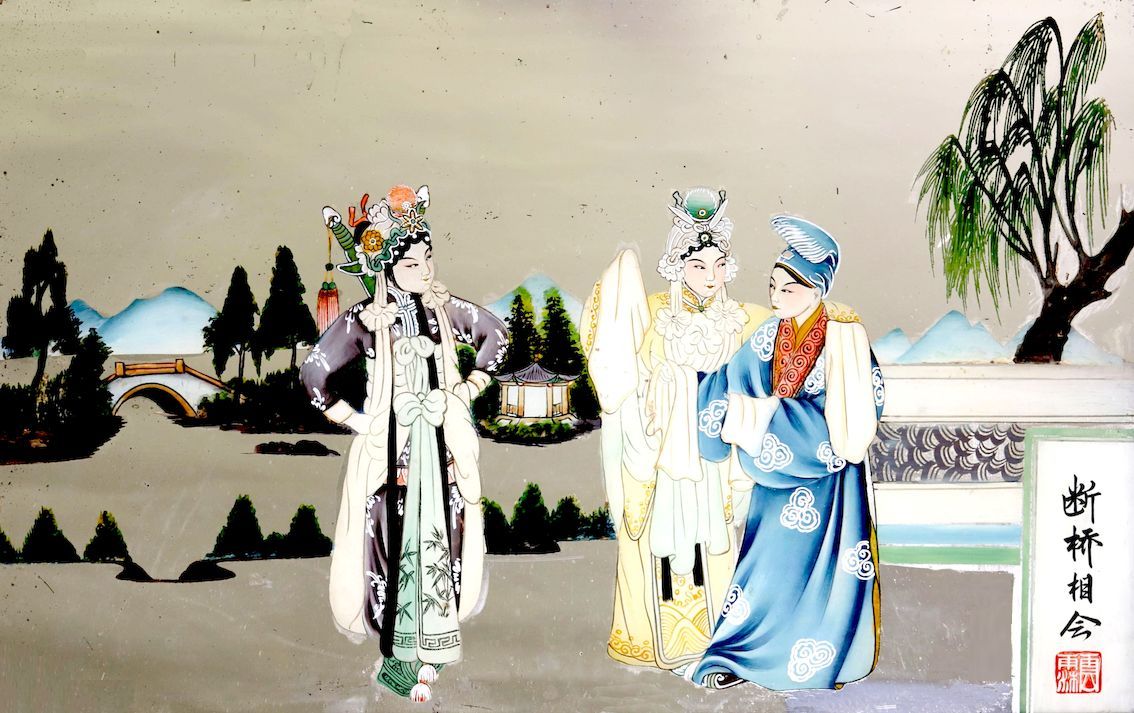
But the priest was not without his own magic. Pulling off his robe, he cast it at the oncoming water, and it became a dyke holding back the flood. Defeated, the two snakes withdrew, appearing suddenly and magically back at the Broken Bridge, beside the very willow where they had met Xǔ Xiān at the beginning of our tale.
Meanwhile, Xǔ himself managed to escape from the monastery and (also suddenly and magically) to rejoin Bái at the willow.
It was not an easy meeting. Bái confessed everything to him, admitting to being an infatuated snake demon. Xǔ swore his love for her anyway, snake or not. And besides, they both knew that their child was due soon.
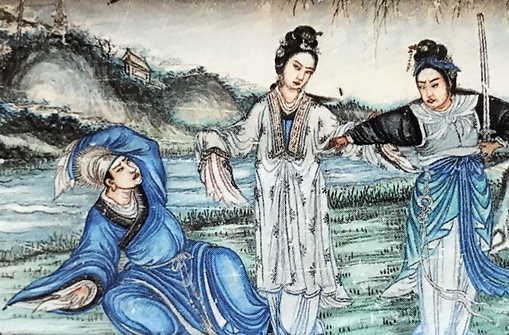
Xiǎoqīng was less forgiving. Whipping out her sword, she attacked Xǔ Xiān for being a wimp, for being a nuisance, and possibly for being more attracted to Bái than to her. Xǔ Xiān, predictably, made no attempt to defend himself, but fell on the ground and asked forgiveness for whatever it was he had done (which wasn't entirely clear to him). Gradually Bái talked her sister back into a morose calmness. So they lived together and waited for the baby to be born, a beautiful little boy.
But Dharma Sea remained determined. He managed to capture Bái and imprison her under the Pagoda of Thunder Peak (Léifēng Tǎ 雷锋塔). She was saved once again by her sister Xiǎoqīng, who journeyed to Mount Éméi to practice the necessarily martial arts, and then returned for the final defeat of the stodgy and unromantic Dharma Sea.
And this shows that love can conquer all obstacles.
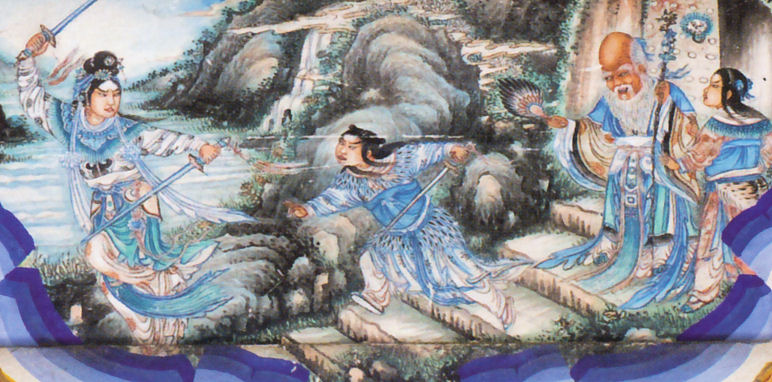
In 2014 Mr. LIÚ Xiǎohǎo 刘小好, one of my students, told me the following prequel to this story, which he said was popular in his home town:
Once upon a time the immortal LǙ Dòngbīn 吕洞宾 sold dumplings filled with sweet paste near a place called Broken Bridge at the beautiful West Lake. A little child came along whose name was XǓ Xiān 许仙, and who would later become the affable young herbalist who would marry BÁI Sùzhēn 白素贞. Little Xǔ Xiān was so taken with the dumplings that he bought them all and gobbled them down, not even stopping to chew.
That was an act of gluttony, and a child who is gluttonous of course becomes sick because that is the way of Heaven, so this happened to Xǔ Xian, whose insides hurt and who for days could eat nothing. Lǚ Dòngbīn, realizing what had happened, lifted the child upside down and shook him till the dumplings came out and fell into the lake.
Now it just so happened that a magical white snake, none other than BÁI Sùzhēn, and a Buddhist monk, none other than Dharma Sea, were both practicing religious austerities in the lake at the time, and the snake had grown very hungry. The snake rushed to devour all the dumplings as they sank into the lake.
Since she was not a gluttonous child, she was not made sick; she was a snake, and so the celestial dumplings made her stronger. That was also the source of the inevitable affinity (the yuánfèn 缘分) between Xǔ and Bái.
Fǎhǎi, in contrast, got no dumplings, and did not get stronger. This seemed to him to be very unfair. His resentment grew and grew with each passing year. And that is why he tried to prevent the happiness of Xǔ Xiān and Bái Sùzhēn.